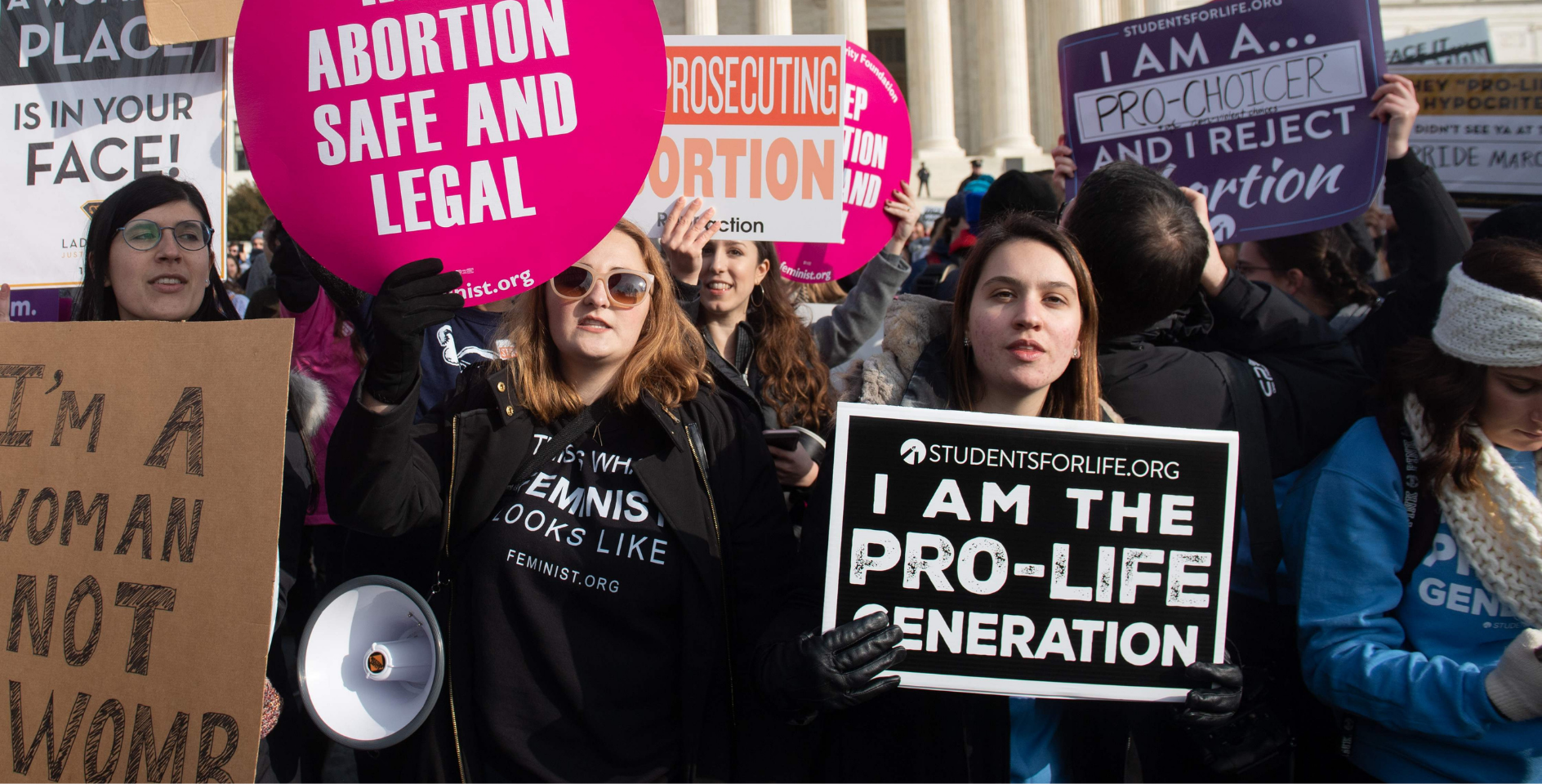The Washington Post recently trumpeted “An Increasingly Bold Religious Movement for Abortion Access,” implying that the faithful are finally getting on board with the cultural moment. Reporter Michelle Boorstein says “people of faith are trying to shift the narrative” in favor of abortion in anticipation of the Supreme Court’s upcoming decision affecting Roe v. Wade.
Boorstein opens with Rev. Kaeley McEvoy, a United Church of Christ clergy member who worried that her new congregation, situated in a politically liberal suburb of Washington, D.C., wasn’t ready to learn that she had recently had an abortion. Boorstein says that to McEvoy,
. . . the [abortion] wasn’t in conflict with her faith. When the pastor [McEvoy] and her then-boyfriend learned in 2016 that she was pregnant, the first place they went was to a cathedral, to pray—and to call doctors’ offices in search of one to do the abortion.
Her boyfriend, she recalls, described the scene at the time, saying, “something holy is happening here.” She later echoed her boyfriend, telling “a group of Christian abortion access activists meeting in a D.C. church: ‘Something holy is happening here, friends.’”
Something holy?
McEvoy says her decision — her choice, her autonomy — to abort was holy. Was it? What makes something holy? We need to know because God calls his people to “be holy, as I am holy” (1 Pet. 1:16). He is our starting point, our definition of what holiness is.
We know his holiness, in part, by knowing his ways (Heb. 3:10). God has revealed his ways — rooted in his holy character — in his law. He clearly forbids murder (Exo. 20:13) and the taking of innocent human life (Psa. 106:38), and he calls us to actively oppose such horrors: “Rescue those who are being taken away to death; hold back those who are stumbling to the slaughter” (Prov. 24:11, emphasis added).
McEvoy’s suggestion that her decision to abort is sacred is, in reality, unthinkable according to Scripture. God is holy. He is sinless (1 Pet. 2:22) and of purer eyes than to see evil and cannot look at wrong (Hab. 1:13). He creates life (Psa. 139:13) in his image (Gen. 1:27) and commands his people to revere life and to be holy as he is holy (1 Pet. 1:15).
Simply saying or deciding something is sacred does not make it so. McEvoy cannot, by her words, transform what God has forbidden into something he approves. Unlike God, we do not have the power to create reality with a word. Abortion is at the heart of evil in our day. Saying that abortion is somehow holy is to lie about the character of God — the giver and sustainer of life.
As God’s people, we are not given permission to baptize our autonomy. Instead, we are called to deny ourselves, take up our crosses, and follow Jesus (Luke 9:23). Our lives, far from belonging to us, are no longer our own (Gal. 2:20). And true worship means offering ourselves to God and being confirmed to his ways (Rom. 12:1-2).
Less support than you think
Even as the Supreme Court is poised to limit or even overturn Roe v. Wade, the Post is trying to legitimize abortion by claiming a surge toward abortion rights among the religious in America. But is it true? The article cites large numbers of clergy and “faith advocates” (450), Jewish rabbis (more than 1,500), a Catholic priest and former U. S. Chaplain, 54 faith groups, and “the most visible leader of Orthodox Christianity in the country (Greek Orthodox) as evidence that the religious community in America is shifting toward active support for “reproductive rights and justice.”
The Post identifies “most mainline Protestant denominations and non-Orthodox Jews as well as the Southern Baptist Convention” (SBC) as those who “adopted positions in favor of abortion legalization” in the wake of the 1973 Roe decision. Though this was true about the SBC when Roe was handed down, it mischaracterizes the SBC by failing to tell the rest of the story. The SBC embraced the pro-life position shortly after Roe with the beginning of the Conservative Resurgence in 1979, and is now among the most visibly pro-life denominations, actively advocating pro-life legistation, court decisions, and policies.
There may be reports of increasing support for abortion among some self-described religious people in America, but as recently as 2021, fully 77% of white evangelical Protestants believe abortion should be illegal in all or most cases. For Christians who take God at his Word, abortion is as grave a cause for repentance today as it ever was.
Respond in love
In the face of such abortion propaganda, how should we respond?
Plead for the lost. Remember that our political opponents are not our enemies (Eph. 6:12). Their pain compels them to defy God in an effort to quiet their consciences. We should pray earnestly for their rescue, for their deliverance from the domain of darkness and their transfer to the kingdom of Jesus, in whom we have redemption, the forgiveness of sins (Col. 1:13-14). Apart from Jesus’ atoning blood, every one of us stands condemned (John 3:36).
Stay sharp. We have a spiritual enemy who uses crafty words to try and confuse us about what is good and true (1 Pet. 5:8; Matt. 4:1-11). But God has given us his Word in order to discern what is true (Heb. 5:14). He instructs us about religious leaders who “cause many to fall by [their] instruction” (Mal. 2:8) and who “profane what is holy; they do violence to the law” (Zeph. 3:4). We must read the Word regularly in order to know the standard against which we are to measure all other words (2 Cor. 10:5).
Pray like Daniel. A man of integrity, Daniel prayed “a prayer of confession and repentance” as part of a sinful people. We, too, belong to a sinful people with a history of corporate sins against God’s law. We are not exempt. We should approach him humbly, in repentance, petitioning him for mercy on our land.
Speak in Love. Urge the people in your life to “seek the Lord while He may be found” (Isa. 55:6). Be a faithful witness of his power to save, the beauty of repentance, the freedom of forgiveness, and the hope of eternal life.
Check your own heart. The temptation to deny sin by calling evil good besets us all. Do you justify coveting, calling it stewardship, or pride, calling it self-esteem? Some justify sinful quietness — not speaking up when they should — by appealing to Paul’s admonition to live peaceable lives. These are but a few examples. What God forbids we often excuse under more respectable names.1Chapter 7 of John Bunyan’s allegory, The Holy War, depicts the Diabolonians tricking Mansoul into rebelling against Emmanuel and the great Shaddai by camouflaging heinous sins with inoffensive names. But new names are powerless to defang ancient sins. We all must run to the cross in repentance and seek the Lord’s forgiveness and grace to turn away from our sin and grow in true holiness.
Care for vulnerable children and mothers. God cares deeply about the weak and vulnerable (Psa. 68:5) and calls us to “vindicate the weak and fatherless; do justice to the afflicted and destitute. Rescue the weak and needy; [and] deliver them out of the hand of the wicked” (Psa. 82:3-4). Preborn babies and their mothers need believers to enter into their suffering with practical help and eternal hope. As we are able, we should seek to join those who are already doing the work, like pregnancy resource centers, and help shape a future where abortion is unthinkable and unecessary.
The Word of the Lord will prove true, regardless of any claims to the contrary. In the meantime we must be wise. We must discern good from evil, what is holy from what is profane. We must do this “out there” in the world, as well as “in here” — our own hearts — not based on the testimony of any one group or religious leader, but always based on the Word of the Lord. And we must love others well, enveloping them in care as we gently speak the words of truth and grace over their lives.










